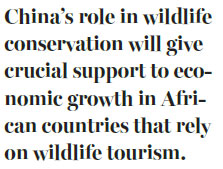China gives African conservation a lift

Continent's resources and natural beauty offer abundance of opportunities for ecotourism and economic development
Over the past two decades, China has launched wildlife initiatives aimed at combating harmful practices such as poaching and trafficking, as well as restoring biodiversity-moves that conservationists agree have helped restore sectors such as tourism, security and trade as they preserved nature.
However, while some of these initiatives have yielded dividends, others are yet to bear fruit. Among the developments in recent years is the need to protect big wildlife in Africa from extinction.
Studies indicate that the number of Africa's big five the lion, leopard, rhinoceros, elephant and buffalo in Kenya, Tanzania and South Africa - have increased. Elephants in Kenya, whose population had plummeted from 35,000 in 1976 to 5,400 in 1988, were at 12,572 in February.

Interestingly, conservationists claim that some measures taken by China to address the African biodiversity problem are tilted toward the conservation of endangered wildlife species - elephants and rhinos-and the elimination of poaching, not the loss of habitat, which is equally important in addressing the threat to the ecosystem.
China has been holding discussions with African leaders in a bid to address the threats to wildlife and habitats by ensuring that the African wildlife and wild lands protection initiatives are adhered to.
As a result of the devastation of poaching, China has signed a memorandum of understanding with the government of South Africa, Kenya, Tanzania and Uganda to combat the illegal wildlife trade occurring in African countries.
The International Union for Conservation of Nature says that the total number of elephants in all of Africa has increased to 415,000-more than four times the number registered in 2007. China has moved fast to introduce harsh penalties for the illegal importation and consumption of products made from the body parts of endangered species.
That has resulted in a ban on the ivory trade in China, and the arrests and prosecution of those involved in the poaching business within its territory. China also supports several NGOs, such as Kenya Wildlife Services, Uganda Wildlife Services and others groups in Africa, to tame the illegal trade.
It has also initiated projects aimed at promoting technical and other support to countries that have been hardest hit by the illegal wildlife trade.
A number of institutions have received equipment from various Chinese enterprises concerned with the conservation of biodiversity that help authorities in Africa to arrest and prosecute poachers. Chinese nationals visiting the country as tourists are also sensitized not to take or buy such commodities in the interest of conservation.
Last year, China doubled its contribution to Africa's conservation development from $10 billion (8.9 billion euros; £7.7 billion) to $20 billion.
Chinese investors' involvement in different projects in Africa has assured most countries in Africa that China is ready for bilateral partnerships on conservation, taking tough measures against involvement in wildlife trafficking.

Today, China is using social media to advantage. It has involved celebrities such as NBA legend YaoMing and actress Li Bingbing to educate its tourists who come to Africa about the country's role in stopping illegal activities in Africa's wildlife and rare wood trade.
Chinese embassies also play an important role in the protection of African wildlife. In Kenya, for instance, the embassy has held various events in which it has clearly stated that it will cooperate with local authorities to find and arrest perpetrators.
China's role in wildlife conservation will give crucial support to economic growth in African countries that rely on wildlife tourism.
The efforts of China and other countries have encourage African countries like Egypt, Senegal, South Africa and Kenya boost tourism.
The African continent is truly adorned with rich diversity, an abundance of untouched resources, natural beauty, cultural heritage, historical sites, wildlife, safaris, beaches, deserts and much more. If used correctly, these could provide considerable opportunities for cultural tourism, ecotourism and adventure tourism.
China should help Africa become food-sufficient, since the continent experiences periodic droughts and floods, often the result of massive deforestation. Restoring forests and grasslands can reduce flooding and sandstorms.
The Asian powerhouse should also deploy its technological advances to help with food production on the continent.
The author is an economist at Zimsky Consultants, Kenya. The views do not necessarily reflect those of China Daily.
(China Daily Africa Weekly 06/09/2017 page9)
Today's Top News
- Experts: Lai not freedom fighter, but a pawn of the West
- Hainan evolves as gateway to global markets
- Opening up a new bridge between China and world
- Tour gives China-Arab strategic trust a boost
- China accelerates push for autonomous driving
- Opening of new gateway can help foster global economic and trade cooperation






























